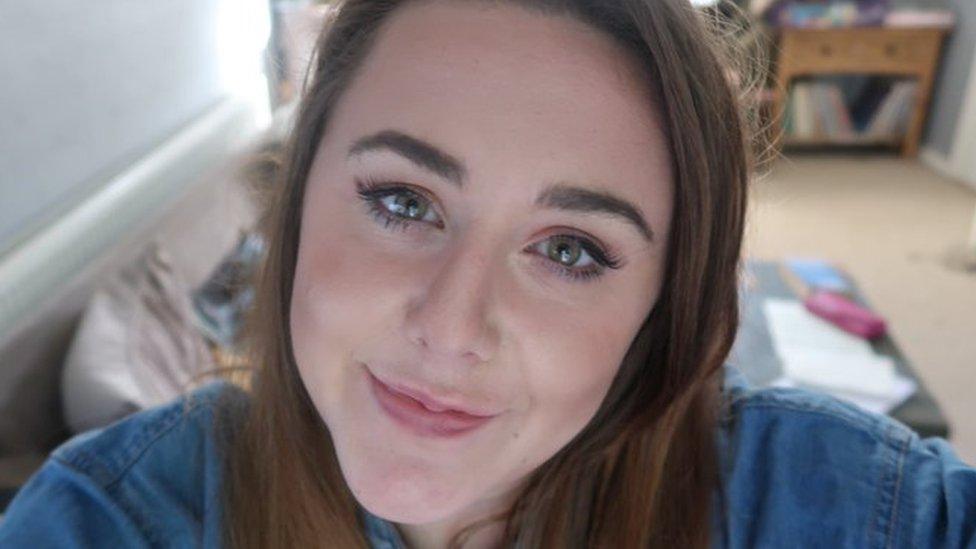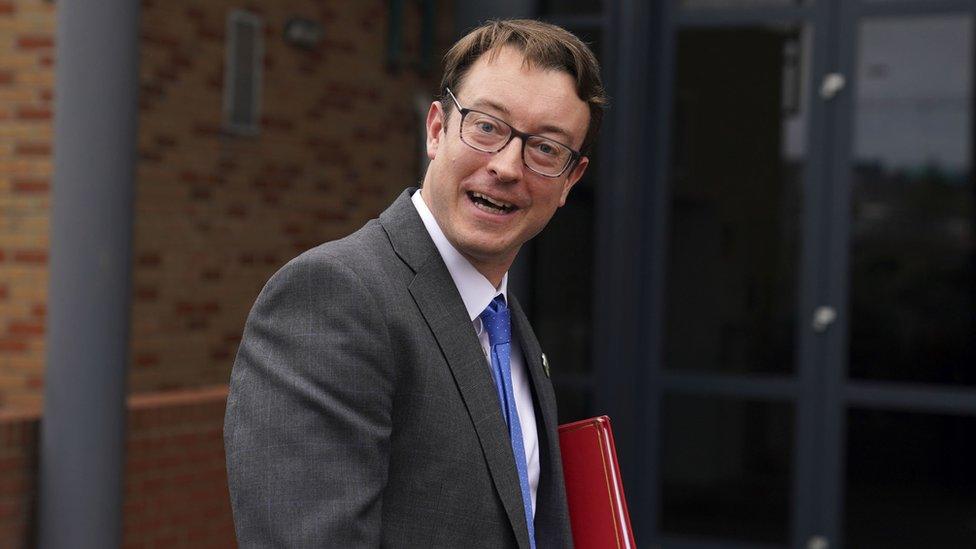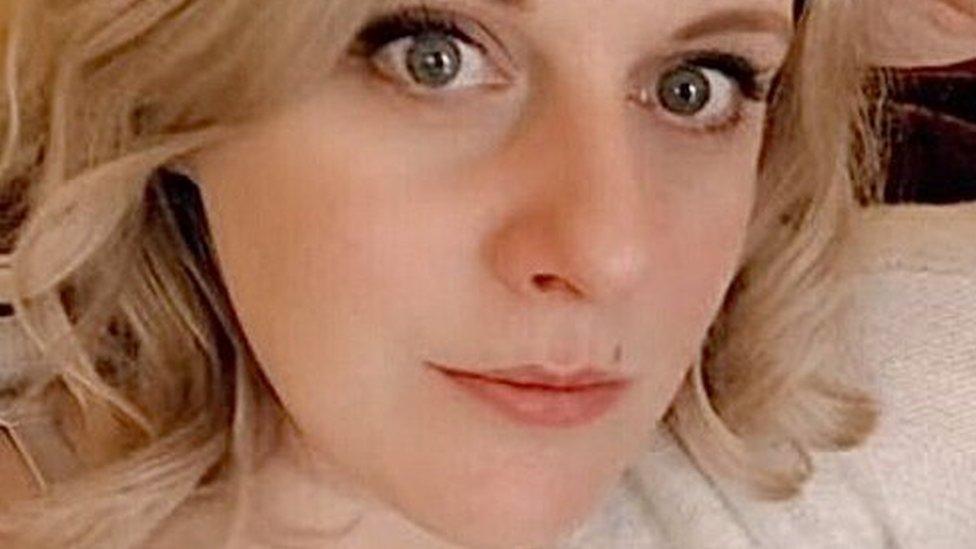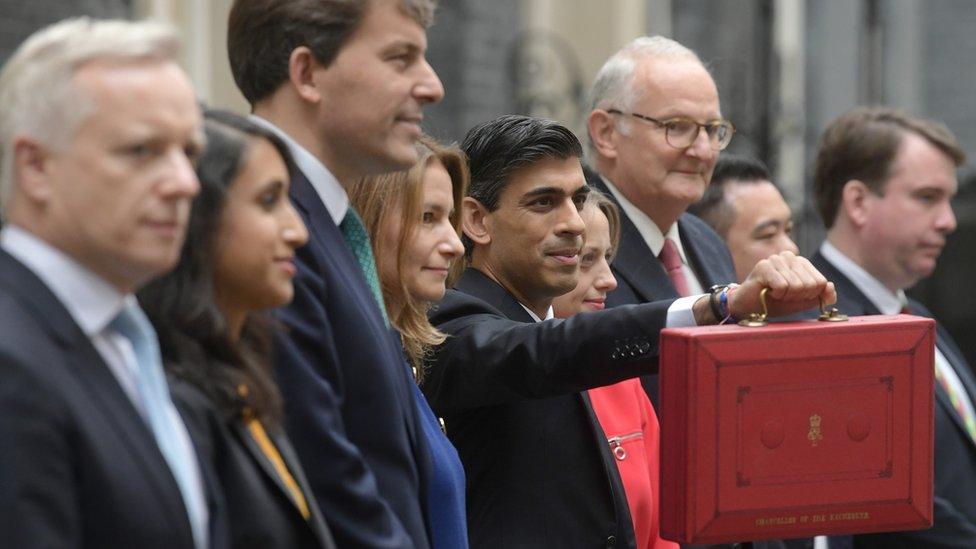'Agoraphobia makes you feel like a prisoner in your own home'
- Published

Agoraphobia is twice as common in women as in men
MP Simon Clarke, chief secretary to the Treasury, shared that he has agoraphobia, which makes him uncomfortable going out in some open spaces - but what is the reality of feeling trapped in your own home?
For Anneli Roberts, 31, from North Wales, the front door of her rural cottage is where her feeling of being safe begins and ends. On some days even making the one-metre walk to the garden gate can feel overwhelming.
Anneli experiences agoraphobia, as a result of post traumatic stress disorder (PTSD), that means she fears being in public spaces. But this isn't just open spaces or crowded ones - it is anywhere she could encounter men who are strangers.
During lockdown, Anneli and her partner lived at her in-laws' house and during that period she stayed in her attic bedroom for more than a month, only leaving to use the bathroom.
"I feel on edge the whole time I am out, especially if I am alone," she says. "It's really quite scary for me."
Anneli uses coping mechanisms such as wearing headphones to avoid loud noises and only using specific routes she knows well.
Earlier this year she managed a 148-day streak of leaving the house, but was knocked off track when she became ill. Now she feels she has to start again.

Simon Clarke has been a Conservative MP since 2017
On Wednesday, Mr Clarke said he would be missing the pre-Budget team photograph because of his agoraphobia. He took part in one previous Budget in March in which the pre-speech photo was taken inside the chancellor's residence, not outside.
He tweeted, external: "I won't be outside for the photos in Downing Street as I live with agoraphobia - which prevents me being comfortable in some open spaces."
The NHS defines agoraphobia, external as a fear of being in a situation where your escape might be difficult or where you won't be able to access help.
Many assume it is just a fear of open spaces - as Mr Clarke stated - but it can also manifest as discomfort with public transport, shopping centres or just leaving home.
And it isn't as black and white as crowded spaces always being a trigger: for Anneli, for example, an isolated street with one person might be more scary than a busy place, and going to a big event like a wedding with family and friends is something she could manage.
It is estimated that two people in every 100 in the UK have a panic disorder and a third of those people will go on to develop agoraphobia. It is twice as common in women as in men and usually starts between the ages of 18 and 35, says the NHS.
Other high profile figures with agoraphobia include actor Kim Basinger and legendary Beach Boys musician Brian Wilson. In 2011, actor Emma Stone also said she was "borderline agoraphobic" during her childhood. "I could not leave my mum's side," she told a magazine.

Tanya says her agoraphobia can be linked to previous stressful moments
Tanya, 36, from Essex, has also had PTSD-related agoraphobia for most of her adult life. Unlike Mr Clarke, this isn't just open spaces, but can be hooked to previous moments of high stress.
Last year Tanya had a full body panic attack during which she lost sensation in her hands and legs. She had to call a friend to take her on the five-minute journey home from the town centre.
"Then this will make you afraid because it's quite humiliating being in tears with no-one around," she says, adding that your mind tends to catastrophise and imagine extreme scenarios such as fainting or falling over without anyone to come to your aid.
A spokesperson for Anxiety UK said: "[It] varies enormously from those who are housebound, even room-bound, to those who can travel specific distances within a defined boundary.
"Some agoraphobics find they can travel more easily if they have a trusted friend or family member accompanying them, however this can quickly lead to dependency on their carer."
Ruth Hatton, 43, from Redcar, who experiences symptoms of agoraphobia but does not have an official diagnosis from her doctor, said she copes by asking her adult daughter to accompany her to the supermarket.
Tanya says that the way she deals with her agoraphobia is by pushing herself to leave the house because although it initially feels like a safe space, you begin to "feel like a prisoner in your own home".

Mr Clarke chose not to join Treasury colleagues for this photo in Downing Street
During the course of the pandemic, for many people agoraphobic behaviour was exacerbated by being told to stay at home in lockdown and remain safe.
Megan Pennell, campaigns manager at Mind told the BBC: "Lots of people are feeling the mental health impacts of the pandemic.
"Right now, 1.6 million people are on a waiting list for mental health support or treatment, and a further eight million people can't even get on the waiting list because of the current thresholds to access care."
But Mr Clarke talking openly about his experience is useful in raising awareness, says Dr David Crepaz-Keay, of the Mental Health Foundation.
"Every time a person in the public eye reveals that they are having psychological difficulties, it tends to help reduce the stigma around mental health problems, which is hugely helpful."